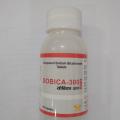Home / Categories / SONATE-300MG(100TAB)

SONATE-300MG(100TAB)
SODIUM BICARBONATE-300MG
VITAMIN AND MINERALS
MAGNUS PHARMA PVT LTD-CDCU KHA
Product Details
Sodium Bicarbonate
A to Z Drug Facts
| Sodium Bicarbonate |
| (SO-dee-uhm by-CAR-boe-nate) |
| Bell/ans, Neut, Sodium Bicarbonate |
| Class: Urinary tract product/alkalinizer; electrolyte; antacid |
 Action Increases plasma bicarbonate; buffers excess hydrogen ion concentrations; raises blood pH; reverses metabolic acidosis.
Action Increases plasma bicarbonate; buffers excess hydrogen ion concentrations; raises blood pH; reverses metabolic acidosis.
 Indications Treatment of metabolic acidosis; promotion of gastric, systemic and urinary alkalinization; replacement therapy in severe diarrhea; used to reduce incidence of chemical phlebitis (used as neutralizing additive solution).
Indications Treatment of metabolic acidosis; promotion of gastric, systemic and urinary alkalinization; replacement therapy in severe diarrhea; used to reduce incidence of chemical phlebitis (used as neutralizing additive solution).
 Contraindications Loss of chloride from vomiting or continuous GI suction when patient is receiving diuretics known to produce hypochloremic alkalosis; metabolic and respiratory alkalosis; hypocalcemia in which alkalosis may produce tetany, hypertension, convulsions or CHF; when administration of sodium could be clinically detrimental.
Contraindications Loss of chloride from vomiting or continuous GI suction when patient is receiving diuretics known to produce hypochloremic alkalosis; metabolic and respiratory alkalosis; hypocalcemia in which alkalosis may produce tetany, hypertension, convulsions or CHF; when administration of sodium could be clinically detrimental.
ADULTS & CHILDREN > 2 YR: IV Administration performed in concentrations ranging from 1.5% (isotonic) to 8.4% depending on clinical condition and requirements of patient. SC After dilution to isotonicity (1.5%). The dose depends on the clinical condition and requirements of the patient (including age and weight). PO 325 mg to 2 g 1 to 4 times daily (patients < 60 yr, maximum dose 16 g/day; patients > 60 yr maximum dose 8 g/day). INFANTS £ 2 YR: IV 4.2% solution at rate £ 8 mEq/kg/day.
Amphetamine, dextroamphetamine, ephedrine, flecainide, mecamylamine, methamphetamine, pseudoephedrine, quinidine: Sodium bicarbonate can decrease elimination of these drugs, thus increasing their therapeutic effects. Chlorpropamide, lithium, methotrexate, salicylates, tetracyclines: Sodium bicarbonate can increase elimination of these drugs, thus decreasing their therapeutic effect. Ketoconazole: PO sodium bicarbonate may decrease the dissolution of ketoconazole in the GI tract, reducing the effectiveness. INCOMPATIBILITIES: Do not mix with IV solutions containing catecholamines, such as dobutamine, dopamine and norepinephrine.
 Lab Test Interferences None well documented.
Lab Test Interferences None well documented.
CV: Exacerbation of CHF. GI: Rebound hyperacidity; milk-alkali syndrome. META: Hypernatremia; alkalosis. OTHER: Extravasation with cellulitis, tissue necrosis, ulceration and sloughing; local pain; venous irritation; tetany; edema.
Pregnancy: Category C. Lactation: Undetermined. Neonates and children < 2 yr: Administration of ³ 10 ml/min of hypertonic sodium bicarbonate may produce hypernatremia, decreased CSF pressure and possible intracranial hemorrhage. Special risk patients: Use drug with caution in edematous sodium-retaining states, CHF, liver cirrhosis, toxemia of pregnancy or renal impairment. Sodium content: May be significant, especially in patients with hypertension or CHF or in patients on low-sodium diets.
| PATIENT CARE CONSIDERATIONS |
|
- For IV solution preparation, use Sterile Water for Injection, Sodium Chloride Injection, 5% Dextrose or other standard electrolyte solutions as diluent.
- With chewable tablets instruct patient to chew thoroughly before swallowing and then to drink a glass of water.
- Do not administer other oral drugs within 1 to 2 hr of oral sodium bicarbonate (antacid) administration.
- Obtain patient history, including drug history and any known allergies.
- Evaluate pH and electrolytes with preadministration values. If there is evidence of alkalosis, notify physician.
- Assess baseline BP and respiratory rate and rhythm.
- Assess serum pH, PaO2, PacO2 and serum electrolytes frequently during therapy. Inform physician of results.
- Test urine to determine pH.
- If patient has edematous tendency, notify physician.
- If patient exhibits shortness of breath and hyperpnea, notify physician.
- If patient is vomiting, withhold medication and notify physician.
- Notify physician if relief is not obtained or if patient demonstrates any symptoms that suggest bleeding, such as black tarry stools or coffee ground emesis.
|
||||
- Instruct patient not to take medication with milk because renali calculi can develop.
- Explain need to avoid otc medications containing sodium bicarbonate, such as Alka-Seltzer. Excessive use of sodium bicarbonate can result in increase acid secretion or systemic alkalosis.
- Instruct patient not to use maximum dose of antacids for more than 2 wk except under supervision of physician.
- Advise patient not to take sodium bicarbonate on routine or long-term basis. Tell patient to notify physician if symptoms of gastric distress continue.
- Caution patient to report these symptoms to physician immediately: nausea, vomiting and anorexia.
Books@Ovid
Copyright © 2003 Facts and Comparisons
David S. Tatro
A to Z Drug Facts
 Route/Dosage
Route/Dosage Interactions
Interactions Adverse Reactions
Adverse Reactions Precautions
Precautions Administration/Storage
Administration/Storage Assessment/Interventions
Assessment/Interventions Patient/Family Education
Patient/Family Education